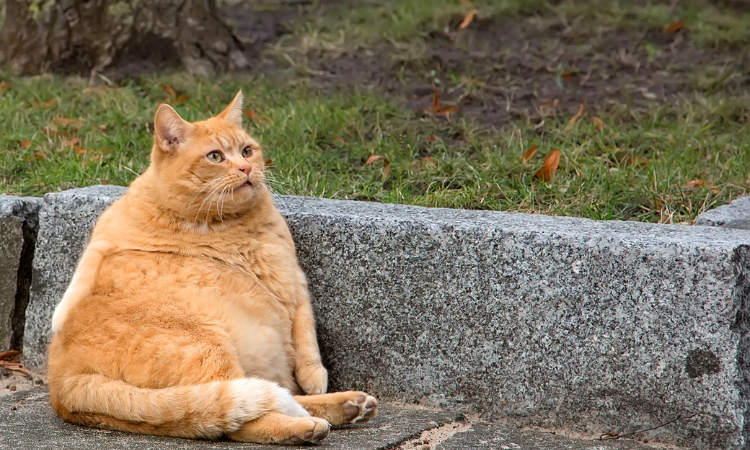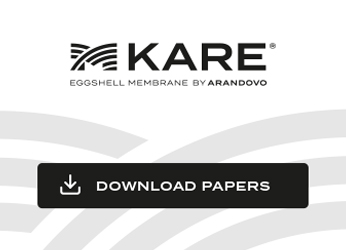Cats are known for their elegance and agility, but when a feline suffers from overweight or obesity, their health and mobility can be seriously affected. At Arandovo, we are committed to the welfare of animals as well as our feline friends, so in this post we will tell you about the impact that excessive weight can have on cats’ joints, how to identify if your cat is fat and you will get some tips to prevent your cat from getting fat.
How to know if your cat is fat
The first step to address any health problem in your cat is to recognize that there is a problem. Feline obesity is a problem that affects many cats worldwide, and its consequences can be serious. Here are some hints for you to know if your cat is fat:
Excessive weight
A cat’s body weight varies by breed, but an average-sized cat generally weighs between 4 and 5.5 kilograms. If you notice that your cat is considerably above this range, they could be at risk of being overweight or obese.
Inability to clean oneself
Cats are very clean creatures that groom themselves regularly. However, overweight cats may have difficulty reaching certain areas of their body, resulting in poor hygiene. If you notice that your cat has dirty or matted fur in places they can’t reach, it could be a sign of obesity.
No waistline
Cats have a natural waistline just behind the ribs. If your cat has a more cylindrical or rounded appearance rather than a defined waist, it is likely that they have excess abdominal fat.
Mobility problems
An overweight cat may have difficulties when jumping, running or performing normal physical activities. If you notice your cat becoming less active and more reluctant to move, this could be due to excessive weight.
Breathing difficulties
Obese cats may experience breathing difficulties, especially when exercising or playing. If your cat is panting easily or having trouble breathing, it’s time to consult a veterinarian.
Consult a Veterinarian
The most accurate way to determine if your cat is overweight is to consult a veterinarian. The veterinarian will be able to assess your cat’s health, measure their weight and offer guidance on how to effectively manage it.
Why do cats get fat?
Understanding why cats get fat is essential to address the problem of obesity. Some of the reasons behind weight gain in cats include:
Inadequate diet
Diet plays a crucial role in your cat’s weight. If you are overfeeding or providing poor quality food, they are likely to gain weight. Portion control and a balanced diet are essential.
Lack of exercise
Cats need physical activity to stay in shape. If your cat spends most of time on the couch or bed, it is more likely to gain weight. Providing toys and opportunities to play can help keep it active.
Stress
Stress can also contribute to weight gain in cats. Changes in environment, routine or the presence of other animals can cause stress in your cat, which may lead them to seek comfort in food.
Sterilization
Spaying or neutering cats is often associated with weight gain. This is because surgery can slow a cat’s metabolism, requiring a reduction in caloric intake to maintain a healthy weight.
Common diseases in overweight cats
Obesity in cats not only affects their physical appearance, but also increases the risk of developing various diseases and health problems. Here is a review with some of the common diseases associated with feline overweight:
Diabetes
Obese cats are at increased risk of developing diabetes mellitus. This disease affects the body’s ability to regulate blood sugar and may require constant treatment, including insulin injections.
Arthritis
Excessive weight places additional stress on your cat’s joints. Over time, this can lead to the development of arthritis, a painful condition that limits your pet’s mobility.
Heart diseases
Obese cats are at increased risk of heart diseases, such as the hypertensive heart disease. This can affect their quality of life and reduce their life expectancy.
Breathing difficulties
Being overweight can also cause breathing difficulties in cats, as mentioned before. This can be especially dangerous if your cat needs to undergo surgery.
Fat cats and joint problems
One of the most important concerns related to obesity in cats is its impact on the joints. Joints are delicate structures that allow for the fluid movement of bones, and when a cat carries excessive weight, said joints are put under additional stress. Some common joint problems in overweight cats include:
Patella dislocation
Patellar luxation is another condition that can affect overweight cats. In this case, the patella (a small joint in the knee) shifts out of its normal position, causing lameness and pain in the affected paw. Excessive weight can contribute to this condition by putting pressure on the knee joint.
Ligament injuries
Overweight also increases the risk of ligament injuries in cats. This includes injuries to the cranial cruciate ligament, which is essential for knee stability. Ligament injuries can be very painful and require surgery to correct.
Hip dysplasia
Hip dysplasia is a condition in which the hip joint does not form properly. While this condition may have a genetic basis, excessive weight can worsen symptoms and increase the pain associated with it.
How to keep your cat from getting fat
The good news is that feline obesity is a condition that can be successfully prevented and treated. Let’s review some effective strategies to prevent your cat from being overweight and promote a healthy weight:
Diet control
Talk to your veterinarian in order to determine the right amount of food your cat should consume based on its age, size and activity level. Avoid overfeeding and unnecessary treats.
Provide high-quality food
Choose high quality, nutritionally balanced foods for your cat. These foods are usually more filling and will provide your pet with the nutrients it needs without excessive empty calories.
Physical stimulation
Make sure your cat gets plenty of exercise and physical stimulation. Playing with interactive toys, providing scratching posts and allowing time outdoors (if safe) are some ways to keep your cat active.
Stress control
If your cat is experiencing stress due to changes in their environment or routine, work on minimizing said stress. Provide a calm and comfortable environment for your pet.

Nutritional supplements for your cat’s health
In addition to following a balanced diet and keeping your cat active, dietary supplements can play an important role in your feline’s health. These are some supplements that may be beneficial for overweight cats:
- Omega-3 fatty acids: such as fish oil, can help reduce inflammation in joints and improve mobility in cats with joint problems.
- Glucosamine and chondroitin: these supplements are known to promote joint health and may be helpful for cats with arthritis or other joint problems.
- L-carnitine: an amino acid that can help your cat burn fat and increase its energy level, which is beneficial for those who are overweight.
- Dietary fiber: can help control appetite and promote satiety in overweight cats, causing them to eat less and gradually lose weight.
Arandovo has developed MKARE, a 100% natural functional ingredient based on egg membrane, which natively contains bioactive compounds beneficial to pet health and that helps you keep your cat in a perfect condition.
MKARE is rich in collagen (I, V and X), hyaluronic acid, elastin, chondroitin sulfate, glucosamine and over 500 proteins. This natural supplement not only promotes joint mobility in pets but also strength and flexibility.
It is important to highlight that a cat with a healthy weight has a better quality of life and greater longevity than a cat with obesity. By taking care of your cat’s diet, exercise and overall health, you can help ensure that they get a long and happy life.
Identifying if your cat is fat, understanding why they are gaining weight and taking steps to prevent obesity are essential steps to ensure your feline has a long and healthy life. Furthermore, proper nutritional supplements can play an important role in their care.
At Arandovo, we are committed to providing you with the information and resources you need to ensure your cat’s well-being. Check out our website now and find out how MKARE can help you maintain your pets’ optimal health.




